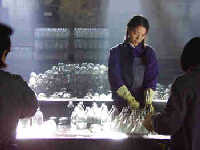That said, by the end of Peacock, there's still a very satisfying sense of having lived alongside the family as both it, and the country itself, moved from being dysfunctional to the beginnings of having a new self-confidence.
Note: This article is very well-written; so only a little polishing was needed. I do have to admit that some of this seems like de ja vu or like beating a dead horse as a review of this movie has already been included in some of the other pieces that I polished (just my opinion)
 Peacock Doesn't Need Gimmicks, or Kung Fu
Peacock Doesn't Need Gimmicks, or Kung Fu
 Gu Changwei's directorial debut, Peacock, has none of the flash or gimmicks of China's recent blockbusters. There are no crouching tigers or hidden dragons, no kung fu hustle. This may help explain why the Peacock script, written by Henan (a province in Central China) writer Li Qiang, the author of a novel by the same name, gathered dust in directors' offices for some seven years without any takers. Several directors read it, but were ultimately afraid that such a simple story would flop at the box office.
Gu Changwei's directorial debut, Peacock, has none of the flash or gimmicks of China's recent blockbusters. There are no crouching tigers or hidden dragons, no kung fu hustle. This may help explain why the Peacock script, written by Henan (a province in Central China) writer Li Qiang, the author of a novel by the same name, gathered dust in directors' offices for some seven years without any takers. Several directors read it, but were ultimately afraid that such a simple story would flop at the box office.
The thoughtful Gu, however, immediately recognized the script's potential and succeeded in turning it into one of the best Chinese films of recent years. Peacock, Gu Changwei's directorial debut, not only scored big in Chinese cinemas, but also won the Jury Grand Prix award at the Berlin Film Festival (Germany) this February.
While the film has neither a stellar cast nor an intricate plot, it has shown that the staleness and ordinariness of Chinese life can be both revelatory and recognizable for moviegoers outside China.
At a length of 140 minutes, the film may seem a bit long for popular viewing. However, for those with life experiences similar to the film's characters, its inherent nostalgia can serve as a moderate reminder of a bittersweet past.
Many Chinese -- even those now living in Beijing's gleaming high-rise complexes -- have no trouble seeing themselves in the film. A typical comment by those who viewed the film is "that's my story," or "that's the story of my parents."
Peacock, the story of three children in an ordinary family in an obscure, remote, post-industrial city in Central China, is a subtle investigation of human conditions in those changing years, according to Gu.
Peacock is really the story of the elder sister Weihong, masterfully played by Zhang Jingchu, a graduate of the Beijing Film Academy. Zhang, for whom Peacock is her first film, is already on her way to becoming a superstar. She dominates the movie with her natural portrayal of the frustrated sister, a young woman who is part daydreamer, part romantic, and ultimately a realist, as most Chinese had to be in those days.
It is a touching, heart-warming, but also heart-wrenching film, says the debuting director, adding: "The audiences will not be shocked but moved by the film."
As a beginner in film directing, Gu did not want to make his maiden work hastily. He tried his best to put together the best production crew and paid close attention to the details. For instance, instead of employing popular Chinese film and TV stars, he hired unknown actors and actresses for the lead roles. They were singled out from at least 1,000 other candidates in auditions.
Peacock turned out to be well worth the wait. The movie succeeds because of its simple but bittersweet cinematography, excellent performances by a cast of new young actors, and its ability to capture the grim realities of China's recent past.
Indeed, the film has been hailed by many critics as an epic with a universal theme. It depicts the inner world of Chinese people, by bringing viewers into a small Chinese city, where ordinary people's dreams, shortcomings, and illusions are revealed.
